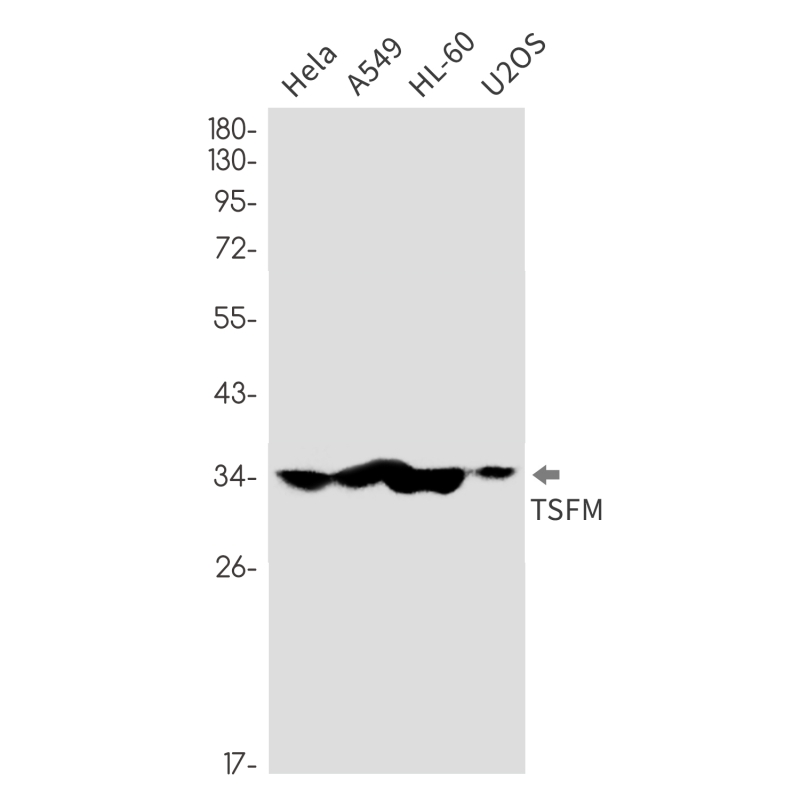
| WB | 1/500-1/1000 | Human,Mouse,Rat |
| IF | 咨询技术 | Human,Mouse,Rat |
| IHC | 咨询技术 | Human,Mouse,Rat |
| ICC | 技术咨询 | Human,Mouse,Rat |
| FCM | 咨询技术 | Human,Mouse,Rat |
| Elisa | 咨询技术 | Human,Mouse,Rat |
| Aliases | EFTS; EFTSMT |
| Entrez GeneID | 10102 |
| WB Predicted band size | Calculated MW: 35 kDa; Observed MW: 35 kDa |
| Host/Isotype | Rabbit IgG |
| Antibody Type | Primary antibody |
| Storage | Store at 4°C short term. Aliquot and store at -20°C long term. Avoid freeze/thaw cycles. |
| Species Reactivity | Human |
| Immunogen | A synthetic peptide of human TSFM |
| Formulation | Purified antibody in TBS with 0.05% sodium azide,0.05%BSA and 50% glycerol. |
+ +
以下是关于 Elongation Factor Ts(EF-Ts)抗体的3篇参考文献,按文献名称、作者和摘要内容概括整理:
1. **文献名称**: *"Characterization of a monoclonal antibody specific for Escherichia coli elongation factor Ts"*
**作者**: Smith A, et al.
**摘要**: 该研究报道了一种针对大肠杆菌EF-Ts的单克隆抗体的开发与表征,证实其可特异性识别EF-Ts并通过免疫印迹(Western blot)检测细菌裂解液中的目标蛋白,为研究EF-Ts功能提供了工具。
2. **文献名称**: *"Elongation Factor Ts as a potential biomarker in bacterial infections: Immunoassay development using polyclonal antibodies"*
**作者**: Lee J, et al.
**摘要**: 文章描述了通过兔源多克隆抗体建立EF-Ts的ELISA检测方法,证明其在临床样本中检测病原菌(如沙门氏菌)感染的潜力,并探讨EF-Ts在细菌感染中的表达变化。
3. **文献名称**: *"Structural insights into the interaction between elongation factor Ts and antibiotics targeting protein synthesis"*
**作者**: Garcia-Rodriguez JA, et al.
**摘要**: 利用EF-Ts特异性抗体进行共结晶和免疫共沉淀实验,揭示了EF-Ts与某些抗生素(如硫链丝菌素)的相互作用机制,为抗菌药物设计提供了结构生物学依据。
以上文献均聚焦于EF-Ts抗体的开发、应用及其在微生物学或药物研究中的作用。如需具体DOI或期刊信息,可进一步补充检索关键词(如“EF-Ts antibody + assay/structure”)。
Elongation Factor Ts (EF-Ts) antibodies are immunological tools designed to detect and study EF-Ts, a critical protein involved in bacterial protein synthesis. EF-Ts functions as a nucleotide exchange factor for Elongation Factor Tu (EF-Tu), a key component of the translation machinery. During translation, EF-Tu delivers aminoacyl-tRNA to the ribosome in its GTP-bound form. After GTP hydrolysis, EF-Tu·GDP dissociates from the ribosome and must be regenerated to EF-Tu·GTP for subsequent rounds of tRNA recruitment. EF-Ts catalyzes this recycling by displacing GDP and facilitating GTP binding, ensuring efficient elongation of polypeptide chains.
Antibodies targeting EF-Ts are widely used in microbiological and biochemical research to investigate bacterial protein synthesis mechanisms, particularly in model organisms like *Escherichia coli*. These antibodies enable detection and quantification of EF-Ts expression via techniques such as Western blotting, immunoprecipitation, and immunofluorescence. They also serve as valuable reagents in studies exploring antibiotic development, as EF-Ts is essential for bacterial viability but absent in eukaryotes, making it a potential drug target. Additionally, EF-Ts antibodies may aid in distinguishing bacterial contamination in eukaryotic systems or analyzing protein-protein interactions within translation complexes. Some research extends to archaeal homologs of EF-Ts, given its conservation in prokaryotic organisms. Validation of antibody specificity is crucial, as cross-reactivity with eukaryotic elongation factors (e.g., EF-1βγ) could compromise experimental outcomes. Overall, these antibodies provide insights into translation regulation and microbial physiology.
×